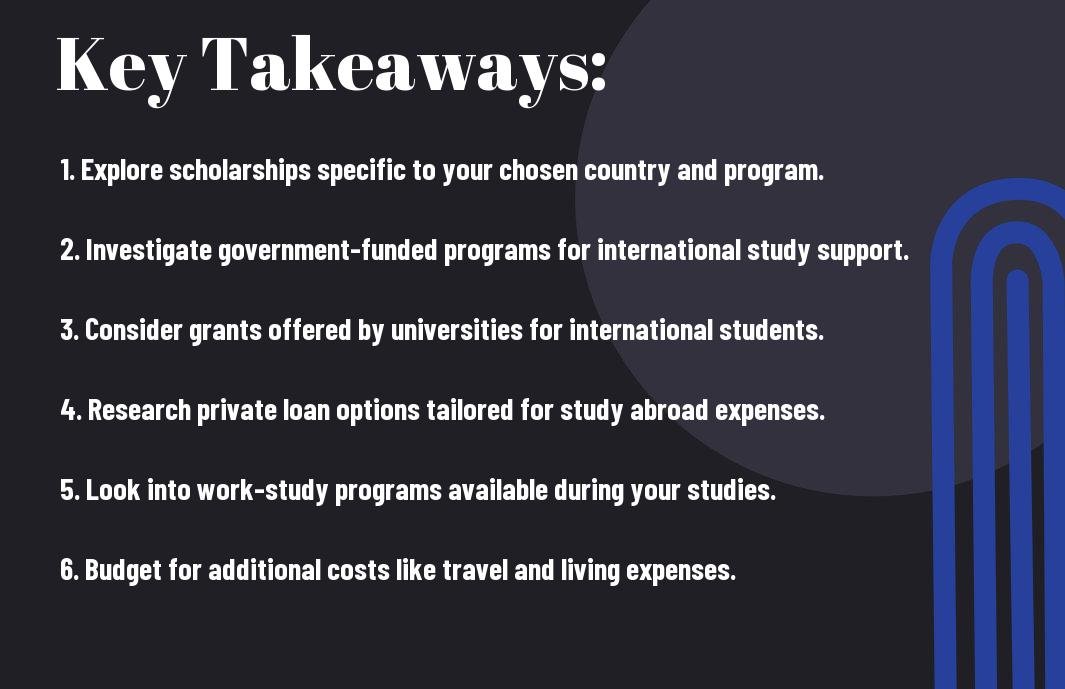Planning For Study Abroad programs can be transformative experiences for students seeking to expand their horizons, but the financial commitment often poses significant challenges. They should explore various financial aid options available for international education, including scholarships, grants, and loans, to alleviate the financial burden. Identifying and applying for these resources can be a daunting task, yet it is vital for ensuring a successful and enriching experience abroad. By staying informed and proactive about financial opportunities, students can make their global education dreams a reality without overwhelming financial strain.
Key Takeaways:
- Diversify Funding Sources: Explore a range of financial aid options, including scholarships, grants, and work-study programs, to support your study abroad journey.
- Understand Eligibility: Research the eligibility criteria for various financial aid options, as some programs may have specific requirements for international students.
- Plan Early: Start your financial planning as early as possible to maximize your chances of securing funding, as many scholarships have early deadlines.
- Consult Your Institution: Contact your university’s financial aid office for guidance on available resources and how to apply for aid when studying abroad.
- Budget Wisely: Create a detailed budget that includes tuition, housing, and living expenses to effectively manage your finances while studying internationally.
Understanding the Costs of Studying Abroad
Your financial planning for studying abroad must begin with a comprehensive understanding of the various costs involved. These expenses extend well beyond just tuition fees; therefore, having a detailed budget is crucial for students aiming to navigate their international education journey successfully.
Tuition and Fees
Abroad, the cost of tuition can vary significantly depending on the institution, location, and specific program of study. Generally, students should anticipate paying higher fees in developed countries such as the United States, Canada, and the United Kingdom, where universities often charge international students a premium. Additionally, it is important for students to factor in ancillary costs that may accompany tuition, such as registration fees, lab fees, and other institutional charges that can quickly add up.
Furthermore, the availability of scholarships and financial aid may impact tuition costs. Some institutions offer specific financial packages aimed at international students, which can alleviate some of their financial burdens. She or he should thoroughly research these options and apply early to maximize his or her chances of receiving support.
Living Expenses
Among the other costs of studying abroad, living expenses can also be significant. This category includes rent, utilities, food, transportation, and personal expenses. Depending on the host country and city, living expenses can widely differ; for example, studying in major metropolitan areas often leads to higher living costs compared to less urban locales. Students must account for these expenses when planning their budget.
Consequently, students are encouraged to research the cost of living in their chosen destination beforehand. Many universities provide guidance on housing options, ranging from on-campus accommodation to off-campus flats. Furthermore, students should explore their options for grocery shopping, dining, and transportation to identify the most cost-effective approaches to meet their daily needs.
Travel and Insurance Costs
About travel and insurance costs, students must not overlook the expense of flying to their destination and returning home for holidays. International travel can be quite pricey, and it’s advisable for students to book flights well in advance to secure better rates. In addition to travel costs, they need to invest in adequate health and travel insurance, which protects against unexpected medical expenses and travel-related issues such as lost luggage or cancellations.
Understanding the importance of comprehensive travel insurance can provide peace of mind. Insurance not only safeguards against potential financial losses, but it also ensures that students can access necessary medical care while abroad. In some cases, institutions may require students to have specific types of insurance coverage, emphasizing the need to check the requirements as part of the planning process.
Currency Exchange Rates
Costs associated with currency exchange rates will also play a pivotal role in a student’s financial planning. Fluctuating rates can influence how far their funds will stretch once they arrive in a foreign country. Students should track currency trends and understand the differences between converting money at the airport, local banks, or through online services, as each option carries varying fees and rates.
Rates can significantly sway the overall budget for studying abroad. Therefore, students should aim to stay informed about the latest, allowing them to maximize their funds. Understanding local banking options and currency exchange services can further assist them in making informed financial decisions while immersed in their studies abroad.

Types of Financial Aid
All students seeking to pursue higher education abroad must be aware of the various financial aid options available to them. By utilizing the right mix, students can significantly alleviate the burden of costs associated with their international education. Below is a breakdown of the primary types of financial aid:
| Type of Financial Aid | Description |
|---|---|
| Scholarships | Financial awards that do not require repayment. |
| Grants | Funds based on financial need that do not require repayment. |
| Student Loans | Borrowed money that must be repaid with interest. |
| Work-Study Programs | Part-time work opportunities to help pay for education. |
| Financial Aid Packages | Combined forms of assistance tailored to individual student needs. |
Scholarships
Behind the various funds available, scholarships stand out as vital financial aid that can ease the monetary burden of studying abroad. They are typically awarded based on academic, athletic, or artistic merit, and do not require repayment. Students should actively research and apply for scholarships offered by universities, government programs, and private organizations. Each scholarship may have specific eligibility criteria and application processes, so diligence is vital.
Students can also benefit from scholarships awarded on the basis of diversity, field of study, or unique backgrounds. For example, many institutions offer merit-based scholarships for outstanding academic achievement, while others may be aimed at minority groups or specific fields such as engineering or the arts. It is imperative that students thoroughly explore all options to maximize their financial assistance.
Planning For Study Abroad Grants
About the financial aid landscape, grants are typically based on financial need and are awarded to help cover the costs of education without requiring repayment. Various organizations provide grants for study abroad programs, including universities and government agencies. These funds can be particularly beneficial as they help reduce the amount of money students must borrow for their education.
Types of grants often vary between federal, state, and institutional programs, as well as those funded by private organizations. Many students qualify for the Pell Grant or specific grants focusing on international studies. Each grant comes with its criteria and application process, so students must be aware of deadlines and documentation required to secure funding.
Types of grants can not only cover tuition fees but also include provisions for living expenses, travel, and other educational costs. Hence, students should take the time to investigate all available grants as they formulate their study abroad plans.
Student Loans
Needbased financial aid often comes in the form of student loans, which are designed to cover remaining educational costs after other forms of financial aid have been applied. These loans require repayment, typically with interest, once the student graduates or drops below half-time enrollment. Borrowing responsibly is vital, as accumulating debt can become overwhelming if not managed appropriately.
To successfully navigate student loans, it is important for students to understand their options, including federal student loans, which often offer more favorable terms than private loans. They should also research repayment plans that best suit their financial situations post-graduation, including income-driven repayment options.
Thou, students must remain informed about the various types of financial aid that best suit their educational paths, ensuring that they make prudent choices when planning for their study abroad experience.
Financial Aid Resources
After deciding to pursue international education, students may feel overwhelmed by the associated costs. However, there are numerous financial aid resources available to help ease this burden. By understanding the various options and utilizing the available resources, students can transform their educational aspirations into reality.
University Financial Aid Offices
Financial aid offices at universities play a pivotal role in supporting students financially during their study abroad journeys. These offices provide vital information regarding grants, scholarships, and work-study opportunities specifically tailored for international students. By reaching out to these offices, students can gain clarity on funding opportunities that align with their individual circumstances. They also help students complete financial aid applications and navigate the complex procedures involved in obtaining aid.
Additionally, universities often have partnerships with specific institutions abroad, enabling them to offer unique funding opportunities. Through these collaborations, students may be eligible for exclusive scholarships or financial support programs that are not widely advertised. Therefore, it is advantageous for students to actively engage with their university’s financial aid office to uncover personalized financial aid advice and options.
Scholarship Search Engines
One of the most effective ways for students to find financial aid is through scholarship search engines. These online platforms allow students to input their personal details, academic interests, and financial needs to generate a tailored list of available scholarships. By utilizing these resources, students can discover numerous opportunities that may not be readily accessible through traditional means. This targeted approach enables students to maximize their chances of securing scholarships that specifically cater to their profiles.
Financial aid from scholarships can significantly reduce the total cost of studying abroad. Students should actively utilize these platforms to conduct thorough searches, ensuring they apply for various scholarships to increase their potential funding. By dedicating time to research and apply for these awards, they empower themselves to access invaluable financial resources, making their international education more attainable.
Government and International Organizations
Before finalizing plans for studying abroad, students should explore the various financial aid opportunities provided by government bodies and international organizations. Many countries offer scholarships and grants to international students as a means to promote educational exchange and cultural understanding. These governmental financial aids may come in the form of tuition waivers, monthly stipends, or travel grants, providing imperative support for students pursuing their studies overseas.
This support can extend from well-known organizations, such as the United Nations Educational, Scientific and Cultural Organization (UNESCO), to national governments committed to facilitating global education. By delving into the programs offered by these entities, students can uncover additional financial resources that enhance their ability to afford overseas education. They play an integral role in fostering educational opportunities and should be a vital part of any student’s funding strategy.

Preparing Your Financial Aid Application
Not every financial aid opportunity will align perfectly with an individual’s circumstances, but it is crucial for them to explore all available options thoroughly. A well-prepared financial aid application can significantly impact the affordability of their study abroad experience. Understanding the different aspects of the application process is vital for students as they navigate this journey.
Eligibility Requirements
Below are some common eligibility requirements that students must meet to qualify for financial aid. Many programs may require applicants to demonstrate a minimum GPA, be enrolled in at least a specific number of credit hours, or have completed certain prerequisite courses. Additionally, applicants may be required to have U.S. citizenship or permanent residency for federal financial aid options.
It is important for students to note that different financial aid programs will have varying eligibility criteria. They should carefully read the guidelines to ensure that they meet all the necessary requirements prior to applying. Students should not hesitate to reach out to their financial aid office if they have any questions about their eligibility.
Application Processes and Deadlines
Beside knowing the eligibility requirements, the application process for financial aid must be understood fully. Students should be prepared to submit their applications in a timely manner, adhering to strict deadlines set by financial aid programs. This may include early submission for federal aid, scholarships, and grants, which are often awarded on a first-come, first-served basis. Failing to meet these deadlines can result in missed opportunities for funding.
Processes are typically outlined on the financial aid office’s website or through scholarship portals. Applicants should ensure they track all relevant dates and understand the submission requirements. A calendar dedicated to important deadlines can be an invaluable tool to keep track of when applications should be completed and submitted.
Required Documentation
Any financial aid application demands a variety of documentation to prove eligibility and support a student’s financial need. This may include items such as tax returns, bank statements, and proof of enrollment in an educational institution. Additionally, letters of recommendation and personal statements are often components of scholarship applications that students shouldn’t overlook.
A comprehensive list of required documentation can typically be found on the respective financial aid website or application portal. Students should start gathering these documents early in the process to avoid any last-minute issues. Having everything organized and ready for submission will streamline their application experience and increase their chances of receiving aid.

Tips for Budgeting While Abroad
For students preparing for their study abroad adventure, effective budgeting is an vital component of ensuring a successful stay. Understanding how to budget wisely can make the experience enjoyable without overwhelming them financially. Here are some helpful tips to assist in managing expenses:
- Create a comprehensive budget that includes tuition, housing, food, and extracurricular activities.
- Track daily expenses to identify trends in their spending and areas where they can cut back.
- Utilize student discounts for transportation, attractions, and dining whenever possible.
- Consider exchange rates and their impact on their overall financial plan.
- Seek out local resources for budgeting advice, financial literacy classes, or workshops offered by universities.
The right financial strategy can significantly enhance their international education experience.
Creating a Budget Plan
Between tuition, living expenses, and travel, establishing a well-defined budget plan can help her navigate her finances effectively. She should start by listing all expected costs associated with her study abroad experience, including tuition fees, accommodation, food, transport, entertainment, and incidental expenses. After estimating these costs, she can prioritize her spending based on her needs and what is most important, ensuring she allocates her resources smartly.
In addition, they may want to factor in unexpected expenses that could arise during their time abroad. An emergency fund is advisable as it serves as a financial safety net for any unforeseen circumstances. Assessing their total available funds—including any financial aid, scholarships, or personal savings—will provide a clearer picture of their financial capacity while studying internationally.
Managing Daily Expenses
About managing daily expenses, students should keep a close eye on their spending habits throughout their stay. Maintaining a daily log of expenditures will allow her to see where her money goes and identify areas to economize. Simple practices such as preparing meals at home instead of dining out, or using public transportation instead of taxis can result in significant savings.
Additionally, they may find it beneficial to leverage budgeting apps or tools that help track expenses in real time. These tools can categorize spending, set limits for different categories, and send alerts when it’s time to re-evaluate their spending habits. Staying proactive in monitoring their expenses will lead to more informed financial decisions throughout their stay.
Creating a conscious effort to cut back can lead to both financial stability and a deeper appreciation for local cultures, as they explore budget-friendly options that align with their educational experience.
Finding Cost-effective Housing and Food Options
Against the backdrop of high living costs in many international cities, students should explore various housing and dining options that are budget-friendly. They may want to consider shared accommodations, such as hostels, or student apartments, which often offer lower rates than hotels or solo leases. Living with locals or other students also provides opportunities to form friendships and learn about the culture directly.
In addition, opting for local markets and street food can significantly reduce food expenses while providing an authentic taste of the local cuisine. This not only supports their budget but also immerses them in the culture. Exploring different neighborhoods can unearth hidden gems for affordable meals and grocery shopping.
Plan to research online for local discounts and community events that may offer inexpensive meals or housing options. This proactive approach enables students to enjoy their experience without the burden of excessive costs.
Alternative Funding Options
To navigate the financial challenges of studying abroad, students should explore various alternative funding options that can supplement traditional financial aid packages. By using creative strategies, they can ease the burden of expenses associated with international education. Not only do these options provide a welcome financial boost, but they also open up new avenues for students to gain valuable work experience and foster connections in their field of study.
Work-Study Programs
Around the world, many universities offer work-study programs that allow students to balance their academic responsibilities with part-time employment. These programs typically provide students with on-campus job opportunities that not only help cover tuition and living expenses but also give them the chance to develop vital skills and gain experience in their chosen field. By participating in work-study, students can reduce their financial stress while also enriching their educational experience at the host institution.
In some cases, students may find that their work-study positions are aligned with their academic interests, allowing them to apply what they are learning in real-world situations. Additionally, these programs often offer flexible hours that can accommodate students’ hectic schedules, making it easier for them to manage their studies while still earning money. This dynamic ensures that students are not only financially supported but also actively engaged in their educational journey.
Crowdfunding for Education
On the other hand, students are increasingly turning to crowdfunding for education as a means of raising funds for their international studies. This method involves creating a campaign on platforms designed specifically for educational funding, where they can share their stories and goals. By promoting their campaigns via social media and personal networks, students can connect with potential donors who are willing to help support their educational aspirations. Crowdfunding provides students with an innovative solution to finance their overseas studies and encourages the community to participate in their educational journey.
This approach also empowers students to take control of their financial destinies. With a well-crafted pitch and engaging storytelling, students can attract support not just from family and friends but also from strangers who resonate with their passion for education. This can lead to a sense of community and shared investment in their achievements, amplifying the motivation to succeed in their studies abroad.
Employer Sponsorship Programs
After considering various funding methods, students may find that employer sponsorship programs present significant opportunities for financial support. Many companies offer sponsorship or scholarship programs for employees who wish to pursue further education, particularly if the studies align with the organization’s goals or needs. By securing sponsorship from an employer, students may receive financial assistance that can significantly reduce their educational expenses.
With this option, the potential benefits extend beyond financial support. Students who gain employer sponsorship not only receive funding but also enhance their professional development through networking opportunities, mentoring, and potential internships. This relationship can prove invaluable, as it connects students with industry leaders who may guide them throughout their careers in their desired field.
Also Read : How Does Student Loan Consolidation Impact Financial Well-Being Post-Graduation?
Final Words
So, as he, she, or they launch on their journey to study abroad, understanding financial aid options is imperative for making international education a realistic goal. Various resources, including scholarships, grants, and loans, play a significant role in alleviating financial burdens. By exploring both institutional and external funding opportunities, students can secure the necessary financial support that aligns with their educational aspirations. Additionally, discussing options with financial aid counselors can provide personalized strategies that cater to individual needs, ensuring a more manageable path forward.
Ultimately, navigating the landscape of financial aid can empower students to focus on their academic and cultural experiences abroad rather than the financial challenges. Through diligent research and proactive planning, students can access the resources that transform their international education dreams into achievable realities. As they take this significant step towards global learning, the investment in their education will undoubtedly yield lifelong benefits and broaden their horizons in ways they may have never anticipated.
FAQs
Q: What financial aid options are available for studying abroad?
A: There are several financial aid options for students planning to study abroad. These include scholarships specifically aimed at international study, grants provided by institutions, federal financial aid programs, and personal loans. Many universities have dedicated resources for students seeking financial assistance for overseas studies, which can include both merit-based and need-based aid. Additionally, some countries offer government-funded scholarships for international students, so it’s advisable to research options in both your home country and the host country.
Q: How can I find scholarships for studying abroad?
A: To find scholarships for studying abroad, start by exploring your current institution’s international office, which often lists available scholarships for students looking to study overseas. Websites like Fastweb, scholarshipportal.com, and the Fulbright Program can also provide leads on scholarships. Additionally, consider looking into organizations, foundations, and governmental programs that specifically fund international education, as these can provide significant financial support.
Q: Can I use federal financial aid for my study abroad program?
A: Yes, in many cases, you can use federal financial aid for your study abroad program, provided that the program is approved by your home institution and meets certain eligibility criteria. Students should consult their financial aid office to inquire about how their aid can be applied, including Pell Grants, Stafford Loans, and other federal assistance. It’s important to ensure that you understand the impact that studying abroad may have on your existing financial aid package.
Q: Are there specific budget considerations I should take into account while planning to study abroad?
A: When planning your budget for studying abroad, consider factors such as tuition fees, living expenses (housing, food, transportation), health insurance, travel costs, and personal expenses. It’s also wise to research the cost of living in the host country, as it can vary greatly. Some countries may offer lower living expenses but higher tuition fees, and vice versa. Creating a detailed budget can help you plan your finances effectively and identify potential funding gaps.
Q: What are alternative funding sources I can explore for my study abroad experience?
A: In addition to scholarships and grants, there are several alternative funding sources for studying abroad. Crowdfunding platforms such as GoFundMe or FundMyTravel allow you to share your educational goals and request donations from friends, family, and the public. Additionally, you might consider part-time work opportunities during your study period, as many countries allow student visa holders to work for a certain number of hours. You could also look into educational loans that cater specifically to international studies.



